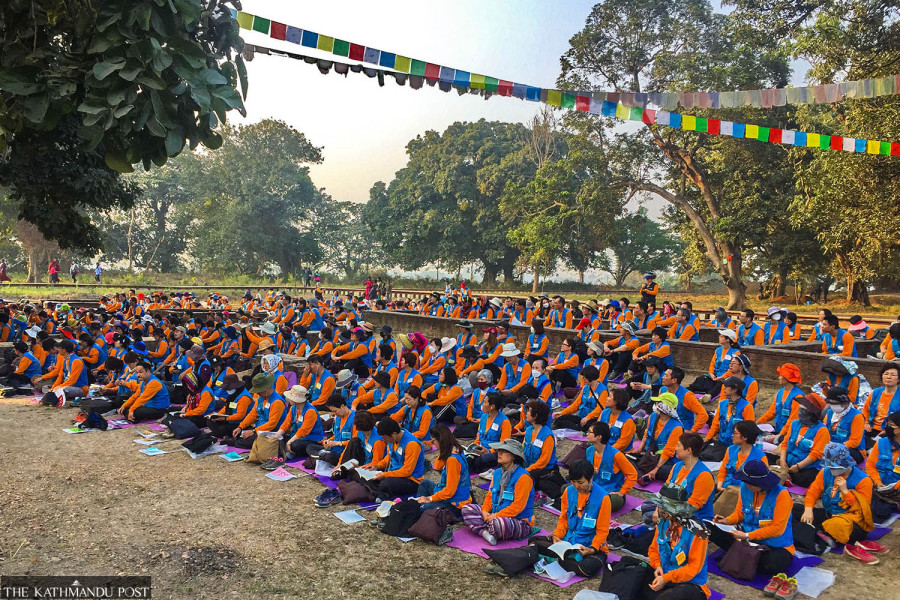Money
Tourists in Bhairahawa wait hours at immigration
On November 3, the immigration office at Belahiya forced around 800 tourists to wait 7–8 hours for visas. No improvement in the situation.
Madhav Dhungana
In Bhairahawa, an international airport has been built to attract tourists, but jets hardly land here. Hotel entrepreneurs to groceries all hoped for a business boom, which didn’t happen.
The number of tourists, though small, who come via the surface route has kept business running to some extent.
But they, too, face hassles.
On November 3, Nepal’s immigration office at Belahiya, Rupandehi, made around 800 tourists wait 7 to 8 hours for visas.
The main door and a few windows of the immigration office broke due to an uncontrolled crowd. Officials said the problem was temporary and would soon be sorted.
But still, tourists have to wait for at least 4 to 5 hours to obtain visas.
Tour guides, bus and taxi drivers, tourists and hotels have started expressing anger at the service full of hassles.
Narayan Prasad Pandey, chief of the Immigration Office, Belahiya, said they are short on manpower. This has resulted in delayed processing of visa services.
“When many tourists come at once, a problem like this occurs. Only five officers, including the chief, handle visa processing. Officials here are compelled to work for 14 hours a day.”
Lumbini, the birthplace of the Buddha, has been a World Heritage Site since 1997. This has been a big draw for tourists for decades.
Most of the Indian visitors come for casino purposes.
Lumbini represents an outstanding universal value regarding religious importance, culture, spirituality and archaeology.
“Tourists coming to Nepal via Sunauli or Belahiya border point is growing, but our manpower strength has not increased,” said Pandey.
Pandey said that sometimes more than 1,500 tourists arrive in a day.
The service is available from four desks. It takes around a minute to provide a visa to a tourist with all the required documents and half an hour for departure clearance.
“If three additional officers are appointed, this problem would be solved immediately. We have been requesting to appoint officers repeatedly to the immigration department,” said Pandey.
Regarding tourist arrival, the immigration Office in Belahiya is the second largest gateway after Tribhuvan International Airport in Kathmandu.
Before the Covid-19 pandemic, the arrival of tourists through the Sunauli border point was 161,396 annually.
The number dropped to zero during the Covid and gradually increased from 2022.
According to the immigration office, more than 83,000 tourists from third countries came to Nepal through the Sunali border point till November this year.
The number of departures is 82,000.
The tourism ministry, Nepal Tourism Board and other government agencies also do national campaigns to promote tourism and draw visitors. However, spending millions on campaigns and programmes failed to address the problem of immigration at Belahiya.
While the three-tier government adheres to the policy to increase the arrival of tourists, tourism entrepreneurs worry about the problems faced by tourists at the immigration.
“Tourists who order dinner at 6 pm go to sleep on empty stomachs due to delays caused by the immigration office,” said Aasha Gurung, director of Hotel Landmark, located 1.5 km from the immigration office.
“As tourists wait for hours, we have started providing refreshments in the queue,” Gurung said.
Tour operators normally allocate an hour for the immigration process, but in Nepal, the delay in immigration makes them wait for 5 to 6 hours.
Most of them who wish to visit Tilaurakot in Kapilvastu, Ramgram of Nawalparasi and Devdaha, all related to Buddhism, must cancel at least one pilgrimage tour to manage time.
Most of these pilgrims avoid eating meals after sunset, according to hoteliers.
“Starting September, 75 percent of hotels were booked by Buddhist pilgrims. Tourists have made advanced bookings for the coming month,” said Gurung.
“The problems faced by tourists on the border have sent a negative message. No one has paid attention to easing the immigration process,” said Sagar Adhikari, former president of Nepal Tour and Travels Association in Lumbini Province.




 14.12°C Kathmandu
14.12°C Kathmandu













